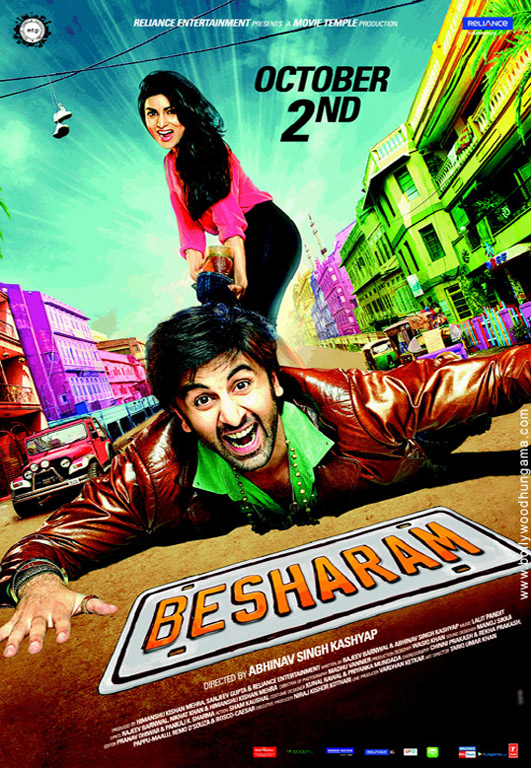Music: LALIT PANDIT Guest composers SHREE-ISHQ
Lyrics: RAJEEV BARNWAL, NIKHAT KHAN & HIMANSHU KISHAN MEHRA
Music label: T-SERIES
Expectations:
A Ranbir Kapoor film after Barfi! and Yeh Jawaani Hai Deewani evokes huge expectations from this generation. Add the presence of Lalit Pandit (ex-Jatin-Lalit) in his biggest solo assignment to date and we want great stuff.
Music:
Lalit Pandit succeeds to a good extent - for one, he adapts himself skillfully to today's times in terms of sound and content, blending the classic leitmotif of the erstwhile duo to a certain extent.
The song 'Love Ki Ghanti' (Sujeet Shetty-Ranbir Kapoor-Amitosh Nagpal) reminds us in feel of vintage Kishore Kumar numbers from the '50s, though the mukhda is a straight adaptation of the extremely well-known Italian song 'Bella ciao'. Naturally, the song is extremely catchy and one craved for Amit Kumar's voice in it instead of Sujeet's, despite the good job he has done on the track! The treatment transcends decades from '50s to the '70s and we end up with an acoustic winner.
In 'Tere Mohalle' (Mamta Sharma-Aishwarya Nigam), Lalit brings together his 'Munni Badnaam Hui' pair of singers in yet another catchy 'item' number, with Aishwarya having a bigger contribution this time. If filmed and placed adroitly like that song within the film, it has the potential to become big.
And, happily, the lyrics (Nikhat Khan) indicate (as with so many recent songs, Dabangg onwards) the slow but sure return of wholesome Hindi to film lyrics. As we listen to refreshing lines like 'Kyoon lambi lambi haanke / Koi na tujhe taanke' instead of the fake 'jannatein-moula-mannatein' lexicon, we are delighted at the shift - which was long overdue!
In fact the Hindi lexicon in this album is music to our starved-for-good language ears even in the other songs here, with the previously mentioned 'Love Ki Ghanti' also having the lines 'Gusse mein chamki / Di mujhko dhamki / Main tas se mas na hua' (Rajeev Barnwal). This 'Hindi' movement that started with Dabangg in 2010 is at last bearing fruit!
Mika-Shreya Ghoshal's 'Aa Re Aa Re' is Marathi folk yet again. Both singers are in their element - Mika especially seems increasingly at home in Maharashtrian folk that he seems to be getting to sing many such songs in films.
There is an element of qawwali brought in momentarily in the 'Dil ke window mein' antara, but the general tenor has the heady percussion of Marathi folk.
Resonant percussion and trumpets herald 'Chal Hand Uthaake Nachche' (Daler Mehndi-Mika-Sunidhi Chauhan). Since this is a song filmed on Rishi Kapoor, Neetu Singh and Ranbir Kapoor, it could have been a terrific number instead of the tepid one it is in all aspects - lyrics, compositions and vocals. This is indeed a lost opportunity when all three stars are known for their music and lively enactment of songs!
However, Lalit Pandit truly comes into his (formidable) own when he gets back to his intense melodious roots. Here is where conviction scores over commerce. Guitars and violins, used very impressively, bring alive 'Dil Ka Jo Haal Hai' (Abhijeet-Shreya Ghoshal), a song in the vintage (Jatin-)Lalit pantheon that has elements of resemblance in musical phrasing to several of their '90s songs, including 'Jo Haal Dil Ka' (Sarfarosh). Abhijeet proves that his near-absence from film music for almost a decade has not rusted his singing prowess one bit. He effortlessly dominates over the formidable Shreya in this melody.
Shreya has one more duet in this album - 'Tu Hai' (with Sonu Nigam). With strong elements of raag-daari, it finds Shreya on home ground, showing the mettle that only comes from impeccable (and extensive) training. Sonu joins her midway through this song, soulfully complementing Shreya. The unplugged version of this song is crisper, with different interludes and the evocative use of the sitar. Between the two versions, we would love to hear ...both!
Guest composers Shree-Ishq (Bector) go all out to be funky in the title-track 'Besharam' that they also render. A mishmash of pop, Punjabi and other folk, rap and other 'with-it' elements, it has the contemporary 'me-too' feel of all such songs. The lyrics are about taking pride in becoming shameless (besharam), but apart from being a dance floor-friendly track, the song has little to recommend it!
There are five remixes, no less, in this album. They are conventionally done, but do not really sound different from the originals, whether it is 'Besharam', 'Tere Mohalle', 'Love Ki Ghanti', 'Dil Ka Jo Haal Hai' and 'Aa Re Aa Re'. In fact, they are geared to make the album dance floor-friendly.
Overall:
Lalit Pandit may make his place in the sun if the film works. The music is trendy, contemporary and peppy.
Our Pick:
Dil Ka Jo Haal Hai, Tu Hai, Love Ki Ghanti, Tere Mohalle


